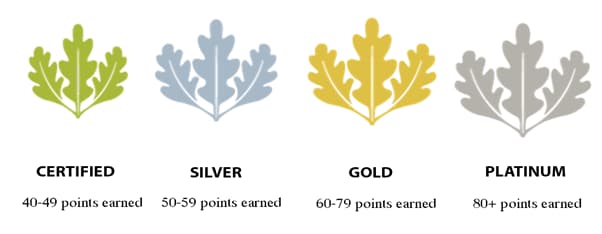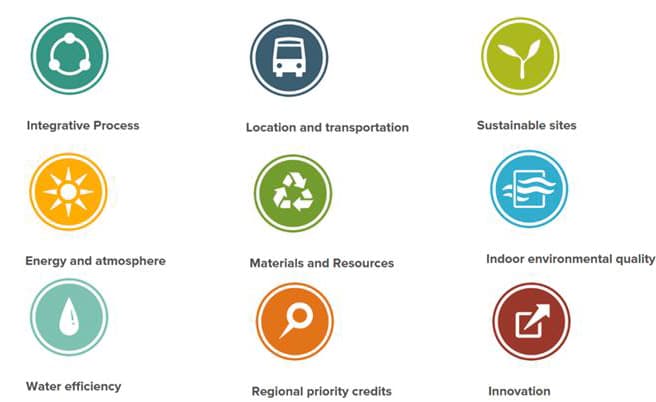
Uptown Dubai Sustainability
What is LEED?
Leadership in Energy and Environmental Design (LEED) is a building rating system developed by the U.S. Green Building Council (USGBC) and internationally recognised to assess the environmental performance of buildings. Projects pursuing LEED certification earn points across several categories, including energy use, water efficiency, materials, air quality etc. Based on the total number of points achieved, a project then earns one of four LEED rating levels: Certified, Silver, Gold or Platinum.

HOW LEED WORKS
LEED provides an independent third party certification that a building was designed and constructed using strategies aimed at an improved environmental performance in six (6) key areas known as credit categories. In addition to this, there are two (2) bonus categories “Innovation in Design” and “Regional Priorities” and an additional category “Integrative Process”. The LEED credit categories.
The abovementioned categories are further subdivided into prerequisites and credits. Prerequisites are mandatory requirements for a LEED certification while credits are weighted with points to reflect their potential environmental impacts; projects have the flexible options to target some LEED credits only.
A LEED assessment can be undertaken for every building typology during any stage of its life cycle. For Uptown Dubai Phase 1, the LEED assessment will be based on Building Design and Construction (BD+C) requirements: applicable to buildings which are being newly constructed or going through a major renovation.
WHY LEED?
Green buildings are built to be environmentally friendly in a variety of aspects and allow us to support the needs of today while being aware of and planning for the needs of future generations. The overall goals include balancing environmental responsibility, resource efficiency, occupant comfort and well-being, and community sensitivity resulting in a high-quality product that enhances marketability, may increase the productivity of occupants and contribute to creating a sustainable community.
Buildings and our built environment have tremendous impacts on us and our surroundings and over 80% of these impacts result from decisions made during the design process. According to the USGBC website, in the United States alone, buildings account for over:
- 36% of total energy use
- 65% of electricity use
- 30% of greenhouse gas emissions 30% of raw material use
- 30% of waste output
- 12% of potable water consumption
Thus by incorporating green concepts during the design phase of a building, we can contribute to the reduction of these environmental impacts and simultaneously create other economic and social benefits. These benefits include improving the quality of life, reducing operating costs, creating positive corporate images and improving productivity.
LEED-certified buildings have been proven to benefit in a number of ways. These include:
- Higher operating efficiency and lower operating costs;
- Promoting occupants’ well-being and comfort and thus increasing their productivity.
- Increased waste diversion from landfills;
- Energy and water conservation;
- Reduction in greenhouse gases;
- An increased real estate value; and
- Contribution to a sustainable planet;
Uptown Dubai Phase 1 LEED Status
The Uptown Dubai Phase 1 development aims to achieve LEEDv4 Gold (i.e minimum of 60 LEED credit points under the Core and Shell Assessment). The design review of the project by the U.S. Green Building Council for LEED compliance will be undertaken after the detailed design stage of the project.
Measures incorporated within the development include;
LOCATION AND TRANSPORTATION
The provision of convenient pedestrian connections over the surrounding highways of the site. This is to allow tenants explore the urban, dynamic JLT and Jumeirah Islands developments nearby (within a walking distance of 400m) and a chance to a relaxed healthy lifestyle in a city otherwise made for cars. Key neighbouring amenities beyond the Uptown Dubai development include:
- Supermarkets
- Pharmacies
- Cafes/Restaurants
- Crèche/day-care centre
- Laundromats
- Hair Salon
- Health Clinics
- Mosque – Masjid Bani Hashim 2
In addition to the pedestrian connections, bicycle storage areas and the development’s close proximity to nearby public transportation (bus & JLT Metro) reduces the need to use cars for day-to-day activities to an extent. Uptown Dubai Phase 1 details a 42% reduction in car park space provision in relation to LEED’s baseline figures.
72 carpark spaces (5% of total space) are specifically designated for green vehicles and an additional 31 (2% of total space) spaces reserved for electric cars with associated charging stations all across the development. Green vehicles are eco-friendly vehicles which run on alternative, low- polluting, non-gasoline fuels such as electricity, hydrogen, propane, compressed natural gas, liquid natural gas, methanol, ethanol etc.
WATER EFFICIENCY
The landscape design of Uptown Dubai Phase 1 incorporates the ‘right plant, right place’ initiative to reduce the outdoor water demand. This has been achieved by utilising native and desert-adapted species within the landscape. Native and desert climate adapted plant species have low irrigation demands like the vegetation typically found within the UAE climate. Look out for the Date palms and Alexandria senna; some of the native species we have onsite.
Additionally, 100% of the irrigation system onsite (i.e. 70m3/day) is catered for via condensate recovery (the collected and treated water in the cooling system) and treated sewage effluent (TSE) generated by the building occupants. The onsite use of condensate recovery and TSE for irrigation systems helps to further preserve freshwater resources of Dubai which faces a potential shortage in the near future.
Indoor water demands have reduced the utilisation of efficient fixtures and fittings within the development. These include; dual flush toilets, low flow urinals and efficient plumbing fixtures.
Furthermore, greywater (wastewater from hand basins, showers etc.) is collected from the development and used for flushing in all public toilets provided at the offices and podium levels, this is to reduce potable water demand.
ENERGY AND ATMOSPHERE
Energy modelling assessments of the Uptown Dubai Phase 1 development were undertaken during all its design phases. This was to test the energy performance of the building at each design stage and highlight additional energy savings measures which could be implemented within the design. The energy model assessed the proposed HVAC design, lighting systems, elevators etc. of the development against ASHARE 90.1 2010 baseline design. At the end of the detailed design stage, Uptown Dubai Phase 1 showcased a 23% energy reduction in relation to the baseline design.
Furthermore, all systems were commissioned by a third party commissioning agent to ensure the building performance of the development will be in accordance to its design.
The following energy-saving measures are incorporated in the development;
- Efficient double glazing for the building façade.
- LED light fixtures with reduced lighting power density and motion sensors to reduce the lighting load when the space is not in use.
- Efficient HVAC and heat recovery systems.
- Demand control fresh air ventilation and extract air control via CO2 sensors.
- Smart faucets that limit the flow of hot water are used to reduce tap and showerhead volume.
SUSTAINABLE SITES
Light, non-reflective surfaces with Reflective Index values ≥29 for paving materials and 82 for roofs have been provided within the Uptown Dubai Phase 1 development to ensure the building does not continuously absorb the sun’s warmth and radiate heat (creating heat islands).
Additional shading has also been provided across walkways and other commonly occupied external areas by the strategic positioning of these elements within the shade of the building. Lush trees and water features distributed around the development also aid in ensuring less heat gains by the development thereby reducing the cooling load (and thus electricity demand) and ensuring appropriate outdoor thermal comfort is maintained.
MATERIALS AND RESOURCES
The most common waste disposal method in UAE is landfilling. Uptown Dubai Phase 1 aims to ensure landfill diversion of most waste generated from the development.
Out of the 8,529kg/day of municipal waste anticipated to be generated at the development; recyclable waste streams constitute 69% (5,885kg/day) of the total waste.
Source-segregation of waste into ‘general’ and ‘co-mingled’ recyclable waste streams is incorporated within the waste management strategy of the development. A well-planned waste system with efficient waste routes, dual waste chute systems or interim storage areas for recyclable waste is in place for a seamless transfer of both streams within the development. Furthermore, the main waste collection areas within the development have been sized to incorporate adequate storage facilities of recyclables until collection by licensed waste service providers.
75% of construction waste by the project will be diverted from landfill disposal.
INDOOR ENVIRONMENTAL QUALITY
The Uptown Dubai Phase 1 development is a non-smoking building. Smoking is not allowed within 10m of the building.
Non-residential tenants can only provide designated smoking areas within their fit-outs provided an air sealing test has been undertaken to ensure there is no escape of air pollutants from these areas.
Fresh air supply to the Uptown Dubai Phase 1 offices operate based on a demand control ventilation system. Installed sensors (connected to the BMS) measure CO2 levels and maintain the indoor air quality of the areas.
The provision of 3m roll-out mats in the primary direction of travel for the main exterior entrances at Ground, Podium 5 and Podium 6 levels to trap sand, dust etc. from outside.
Maintenance of interior cross-contamination from areas with hazardous gases including toilets, laundry areas etc. via partitioning, self-closing doors and hard lid ceilings provision. In addition to maintaining negative air pressures within these areas, to ensure foul pollutants are appropriately exhausted.
INNOVATION
In addition to its non-reflective, light coloured paving and roof materials, Uptown Dubai Phase 1 incorporates 100% shading for all parking spaces of the project.
The operational phase of the development has been assessed during the design stage to ensure the building’s operational practices are in accordance with LEED’s Operation and Maintenance Starter Kit.
REGIONAL PRIORITY
LEED regional priority credits aim to incentivize the achievement of LEED credits that address geographically specific environmental, social equity, and public health priorities. Due its location in the Middle East and by complying with measures of the following LEED credits (in accordance with LEED requirements), Uptown Dubai Phase 1 earns additional points for the following;
- Optimize Energy Performance
- Indoor Water Use Reduction
- Outdoor Water Use Reduction
- Heat Island Effect

